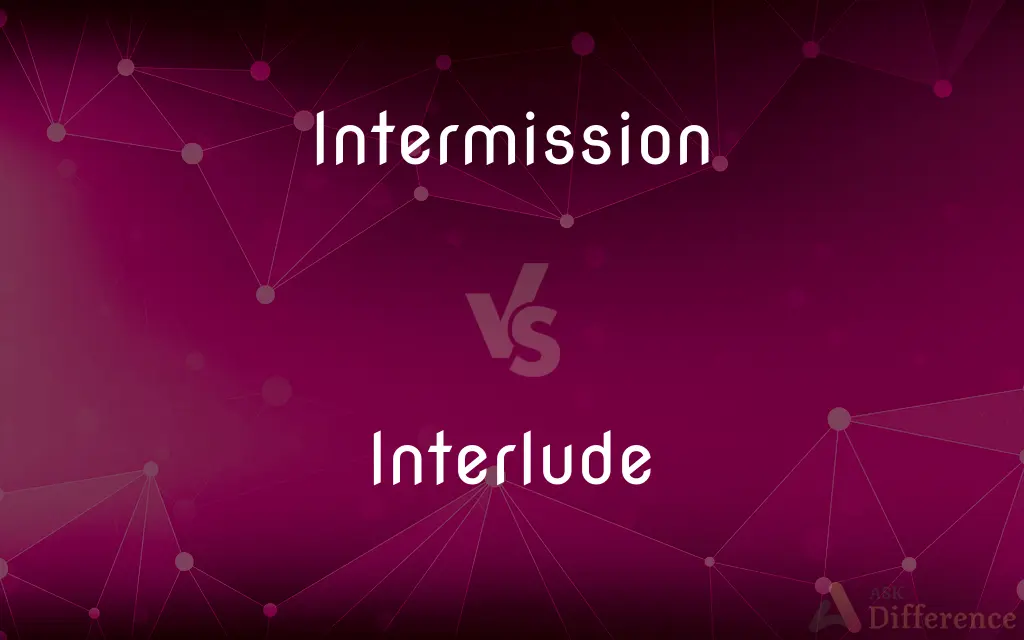Intermission vs. Interlude — What's the Difference?
Edited by Tayyaba Rehman — By Maham Liaqat — Updated on April 2, 2024
Intermissions are breaks during events for rest or socialization, while interludes are short pieces within an event, often musical or theatrical.

Difference Between Intermission and Interlude
Table of Contents
ADVERTISEMENT
Key Differences
Intermissions are planned breaks in events like plays, concerts, or sports games, allowing attendees to rest, socialize, or attend to personal needs. These pauses typically last from 15 to 30 minutes and are integral to the structure of many public performances and gatherings. On the other hand, interludes are brief, intervening pieces or performances within a larger event, often serving as a transition or offering thematic contrast without causing a complete halt to the main event.
The purpose of an intermission is primarily practical, providing a necessary break during lengthy events. This pause helps maintain audience engagement by preventing fatigue and allowing for a comfortable experience. Interludes, whereas, serve an artistic or thematic function, enhancing the overall experience through additional content that complements or contrasts with the main performance.
Intermissions are commonly found in traditional performance arts settings, such as operas, ballets, and plays, as well as in modern cinema and sporting events. These breaks are expected and planned for, with venues often accommodating the needs of attendees with concessions and restrooms. Interludes, on the other hand, are more flexible in their occurrence and can be found in a variety of settings, including musical concerts, plays, and even between segments of a formal ceremony, adding depth or providing entertainment during transitions.
The timing and placement of intermissions are carefully considered to occur at a natural pause in the event, ensuring a smooth transition for the audience. This strategic placement is crucial for maintaining the momentum and coherence of the event. Interludes, whereas, can be more spontaneous or creatively integrated into the flow of the event, often used to maintain interest during set changes or to enhance the thematic linkage between segments of the performance.
While both intermissions and interludes contribute to the pacing and structure of events, their significance goes beyond mere breaks in action. Intermissions represent a communal aspect of event-going, offering a moment for audience interaction and reflection. Interludes, on the other hand, enrich the artistic and thematic expression of an event, providing additional layers of meaning or entertainment.
ADVERTISEMENT
Comparison Chart
Purpose
Provides a break for attendees.
Offers additional content within the event.
Function
Practical: rest and socialization.
Artistic or thematic: enhances the main event.
Occurrence
In planned intervals, usually halfway.
Varies, often between main sections or acts.
Duration
Typically 15 to 30 minutes.
Shorter, length varies based on the event.
Common in
Theatrical performances, concerts, cinema.
Concerts, plays, ceremonies.
Compare with Definitions
Intermission
Allows attendees to socialize or refresh.
Friends discussed the play's first half over drinks during the intermission.
Interlude
A short performance within a larger event, often musical.
An instrumental interlude provided a seamless transition between scenes.
Intermission
A break during a performance or event.
The audience stretched their legs during the intermission.
Interlude
Can occur in various event types, not just musical.
The conference featured an interlude with a guest speaker on innovation.
Intermission
Serves to divide a lengthy event into manageable segments.
The opera had an intermission between the second and third acts.
Interlude
Enhances thematic transitions or provides entertainment.
The play included a comedic interlude to lighten the mood.
Intermission
Often features amenities like snacks or merchandise sales.
The theater lobby was bustling with activity at intermission.
Interlude
Length and content vary based on the main event.
The interlude was a brief, yet powerful, spoken word piece.
Intermission
Planned into the structure of the event.
The concert program listed a 20-minute intermission after the first set.
Interlude
Adds depth or contrast to the primary performance.
The dark, dramatic interlude underscored the play's main themes.
Intermission
An intermission, also known as an interval in British and Indian English, is a recess between parts of a performance or production, such as for a theatrical play, opera, concert, or film screening. It should not be confused with an entr'acte (French: "between acts"), which, in the 18th century, was a sung, danced, spoken, or musical performance that occurs between any two acts, that is unrelated to the main performance, and that thus in the world of opera and musical theater became an orchestral performance that spans an intermission and leads, without a break, into the next act.Jean-François Marmontel and Denis Diderot both viewed the intermission as a period in which the action did not in fact stop, but continued off-stage.
Interlude
An intervening episode, feature, or period of time
"Kerensky has a place in history, of a brief interlude between despotisms" (William Safire).
Intermission
An interval between periods of activity, as between the acts of a play.
Interlude
A short farcical entertainment performed between the acts of a medieval mystery or morality play.
Intermission
A break between two performances or sessions, such as at a concert, play, seminar, or religious assembly.
We ordered some drinks for the intermission.
Interlude
A 16th-century genre of comedy derived from this.
Intermission
The act or the state of intermitting; the state of being neglected or disused; disuse; discontinuance.
Interlude
An entertainment between the acts of a play.
Intermission
Cessation for a time; an intervening period of time; an interval; a temporary pause; as, to labor without intermission; an intermission of ten minutes.
Rest or intermission none I find.
Interlude
(Music) A short piece inserted between the parts of a longer composition.
Intermission
The short period between acts of a play, concert, opera, or other public performance when the audience may leave their seats for refreshment; - it usually lasts from 10 to 20 minutes.
Interlude
An intervening episode, etc.
Intermission
The temporary cessation or subsidence of a fever; the space of time between the paroxysms of a disease. Intermission is an entire cessation, as distinguished from remission, or abatement of fever.
Interlude
An entertainment between the acts of a play.
Intermission
Intervention; interposition.
Interlude
(music) A short piece put between the parts of a longer composition.
Intermission
The act of suspending activity temporarily
Interlude
(transitive) To provide with an interlude.
Intermission
A time interval during which there is a temporary cessation of something
Interlude
A short entertainment exhibited on the stage between the acts of a play, or between the play and the afterpiece, to relieve the tedium of waiting.
Dreams are but interludes, which fancy makesWhen monarch reason sleeps.
Interlude
A form of English drama or play, usually short, merry, and farcical, which succeeded the Moralities or Moral Plays in the transition to the romantic or Elizabethan drama.
Interlude
A short piece of instrumental music played between the parts of a song or cantata, or the acts of a drama; especially, in church music, a short passage played by the organist between the stanzas of a hymn, or in German chorals after each line.
Interlude
Any intervening period of time, space, etc.; a pause between phases of an activity.
Interlude
An intervening period or episode
Interlude
A brief show (music or dance etc) performed between the sections of another performance
Interlude
Perform an interlude;
The guitar player interluded with a beautiful improvisation
Common Curiosities
What is an intermission?
An intermission is a planned break during an event for rest, refreshment, or socialization.
Can an interlude be musical?
Yes, interludes are often musical pieces but can also be theatrical or spoken, depending on the event's context.
Why are intermissions necessary?
Intermissions provide a necessary break during lengthy events, helping to maintain audience engagement by allowing for rest and socialization.
Where are intermissions commonly found?
Intermissions are common in operas, ballets, plays, cinemas, and sporting events.
How long does an intermission typically last?
Intermissions usually last from 15 to 30 minutes, depending on the event.
How do interludes enhance an event?
Interludes add depth, contrast, or thematic linkage between segments, enhancing the overall experience and maintaining audience interest.
Can an event have both intermissions and interludes?
Yes, many events incorporate both to provide breaks and add artistic content.
What makes an interlude different from the main event?
An interlude is usually shorter and serves as a transitional or complementary piece, whereas the main event is the primary focus.
Are intermissions planned in advance?
Yes, intermissions are strategically planned into the event's structure.
What is an interlude?
An interlude is a short piece or performance within a larger event, offering additional content or thematic transition.
How do attendees typically use intermission time?
Attendees may use intermission time to visit restrooms, purchase refreshments, or discuss the event with others.
What functions do interludes serve?
Interludes can serve artistic, thematic, or entertainment purposes within an event.
Do all events have intermissions?
Not all events have intermissions; their inclusion depends on the event's length and format.
Can interludes contain dialogue or narration?
Yes, interludes can include dialogue, narration, or any form of performance that fits within the broader event.
Is the timing of intermissions and interludes flexible?
Intermissions have fixed timing, while interludes can be more flexibly integrated into the event.
Share Your Discovery

Previous Comparison
Correct vs. Proper
Next Comparison
Authorized vs. UnauthorizedAuthor Spotlight
Written by
Maham LiaqatEdited by
Tayyaba RehmanTayyaba Rehman is a distinguished writer, currently serving as a primary contributor to askdifference.com. As a researcher in semantics and etymology, Tayyaba's passion for the complexity of languages and their distinctions has found a perfect home on the platform. Tayyaba delves into the intricacies of language, distinguishing between commonly confused words and phrases, thereby providing clarity for readers worldwide.













































